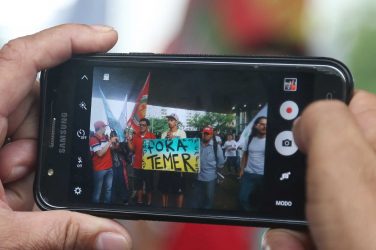
There seems to be very little tangible evidence of progress
on vital reforms in pension, labor, tax
and politics.
Democracy takes time in the tropics especially when Congress
works only from
Tuesday afternoon until Thursday noon.
On October 29, 2002, Lula defeated José Serra in the second round of Brazil’s presidential elections. That means that
Lula and his team have had four months to begin to effect some of the changes necessary for Brazil to resume economic
growth, without which his many promises to improve the lot of the people will be impossible to fulfill. What has been
accomplished? How are the much-heralded pension, tax, labor and political reforms coming along? Will the Central Bank have autonomy
and be free of political pressure? Unfortunately there seems to be very little tangible evidence of progress on these vital issues.
President Lula is doing the best he can to have solutions evolve from a consensus rather than being imposed from
above. But in a society with so many divergent interests, this is difficult if not impossible, in my opinion. Lula formed a Council
for Economic and Social Development consisting of 82 figures of his choice. This unwieldy board has met once. It consists
of a cross section of the society including several government ministers, representatives from labor, the church, business,
banking, the liberal professions and NGOs.
The alleged mission of this group is to act as an advisor to the President. This caused jealousy with Congress who
sees this council as a threat to its function. I seriously doubt if this fear is justified, as the Council will never be in a position
to draft legislation. In fact it would not surprise me if it never meets again and fades into the twilight.
At the end of February, Lula convoked Brazil’s 27 state governors for a two-day meeting in Brasília. At the end,
everyone agreed that pension and tax reforms are necessary and the governors pledged their support to accomplish this. No
opposition to the general concept of reforms has been registered so far. But when it comes time to actually approving concrete
proposals, which are bound to adversely affect certain groups, many may cry foul.
Special interest groups have already shot down trial balloons launched by Social Security Minister Ricardo Berzoni.
Both pension and tax reforms are technically complex and extremely polemic issues. No one will be willing to give up any
existing privileges or tax revenues. The eventual positive effects on the government’s revenues and expenses have yet to be
quantified. Creditors expect that resultant improvements in public finance will come sooner rather than later and may become
impatient if the needed changes delay beyond the first semester of 2003.
Until such time as the government, presumably the executive branch, presents projects to Congress, nothing but talk
will be in evidence. This is not necessarily bad for Brazil, as Lula—due to his continued popularity—has the unusual
opportunity to lead the nation to make these difficult changes. Once Congress becomes involved, more time will elapse before
anything is accomplished as various committees will have to examine the measures and make alterations that in turn must be
sanctioned by the executive branch. Amendments to the constitution will be required in some cases. Democracy takes time in the
tropics especially when Congress normally works only from Tuesday afternoon until Thursday noon.
An element of distraction lately has been the case of tapping of telephones in Bahia. Senator Antonio Carlos
Magalhães, also known as ACM, has been implicated, which caused him to step down as Chairman of the Constitution and Justice
Committee in the Senate. This will no doubt blow over in time with no one being punished. But it does provide a topic for the media,
which is starved of any real news at this time of year. In my opinion, ACM has served his purpose as a politician and should
vanish. This is unlikely to happen as he was recently elected for another term as senator from Bahia, an important state that he
has controlled for decades.
There is a certain amount of consternation in the rural sector over the behavior the Minister of Agrarian Reform,
Miguel Rossetto. He remained mute when a group of the MST (Movimento dos Sem Terra) or landless people held a state
official captive in the northeastern state of Alagoas. This poor man was later released unharmed. But the fact that the minister
made no comment on this lawless behavior is unsettling. Rossetto has also appointed several known troublemakers, who tend
to support the MST that helped elect Lula, to key posts in the ministry.
So far the MST has been patient with Lula’s government, but sooner or later there are bound to be scuffles as
private property is illegally occupied by the MST and their cohorts. Legitimate landowners may react to these unlawful
invasions and violence could ensue. These events might be noted by the international media that would blemish the rather
positive image of Brazil that they are projecting at the moment.
Genetically Modified or Not
Another issue that is adversely affecting rural activity is the indecision of the government over the use of
genetically treated seeds for planting soybeans. So far, their use is prohibited. But it is estimated that 20 percent of the Brazilian soy
crop is a result of the use of these disease and herbicide resistant seeds that are smuggled from Argentina, where they are
permitted. Lula has appointed a commission consisting of nine ministers of state to examine this situation.
They are worried about the possible ill effects on the health of those who consume food products containing
genetically modified elements. Efficiency and productivity would be increased substantially when legal use of these seeds is
permitted. I wouldn’t hold my breath due to lack of anyone willing to make a possibly contentious decision. With nine ministries
involved, the studies could drag on indefinitely. In theory Brazil receives a premium in Europe for non-altered soy products. But
the increase in export earnings that could be realized by increased production far surpasses whatever premium is actually
received, in my opinion.
So far on the economic front, the declarations of intent of Antonio Palocci continue to warm the hearts of bankers
and analysts even though he is exposed to extreme criticism from the radical elements of the PT. He has not opened federal
coffers to governors seeking aid for their bankrupt states. Interest rates were raised for a second time since Lula took office.
This time the central bank also increased banks’ reserve requirements.
This has had the effect of making credit scarcer and dearer, which in theory will help slow down inflation currently
running at more than 2 percent per month. Banks are now charging as much as 171 percent p.a. for individual’s overdraft credit
and 54 percent to finance automobile purchases. The average rate for corporate credit, according to the same report, is 34.5 percent.
Not everyone agrees with the sagacity of these measures as inflation is not being caused by excess in demand but
rather is cost driven, it seems to me. Local interest rates and consequently the spread earned by banks are among the highest
in the world. The banks’ return on capital is roughly four times that of the productive sector. Don’t count on central bank
autonomy happening quickly.
The real is still fairly steady in the R$3,50-R$3,65 to the dollar range. The so called Brazil Risk is at its lowest level
since June of last year as C-Bonds climbed up to $0.72 to the dollar making it an attractive investment for those believing that
Brazil will be able to continue meeting its foreign obligations. The World Bank is lending Brazil US$ 550 million for general
purposes to help shore up reserves in case there is a crisis.
BNDES (Banco Nacional de Desenvolvimento Econômico e Social—National Economic and Social Development
Bank) has obtained a loan of US$300 million from the Japanese Bank for International Cooperation. It appears as if the talks
with the IMF went well and another disbursement under the $30 billion aid package arranged last year will be forthcoming. A
stated goal of Palocci is to lessen dependence on foreign credit, which would be a major accomplishment. For the moment, it
appears that things are headed in that direction.
Brazil is concerned about the effects on its economy of a war between the U.S. and Iraq. High oil prices will hurt
although Brazil now imports only 20 percent of its crude oil requirements. The appetite for Brazilian paper in world markets is
expected to contract as investors look for a safe haven that does not included high-risk countries such as Brazil. The resultant
slump in the world economy will not help Brazil’s export drive. The government has hopes that with new borrowings and a
reasonable percentage of rollovers of maturing foreign debt, there will be no trouble in honoring its obligations.
Carnaval activities officially run from Friday until noon on Ash Wednesday. Things have already slowed down from
a brief spurt of activity when schools resumed classes. Observers should not expect any developments of consequence in
Brazil until after March 10.
Richard Edward Hayes first came to Brazil in 1964 as an employee of Chase Manhattan Bank. During the past
thirty-eight years, Hayes has worked directly and as an advisor for a number of Brazilian and international banks and
companies. Currently he is a free lance consultant and can be contacted at
192louvre@uol.com.br
Discuss it in our Forum
Send
your
comments to
Brazzil



